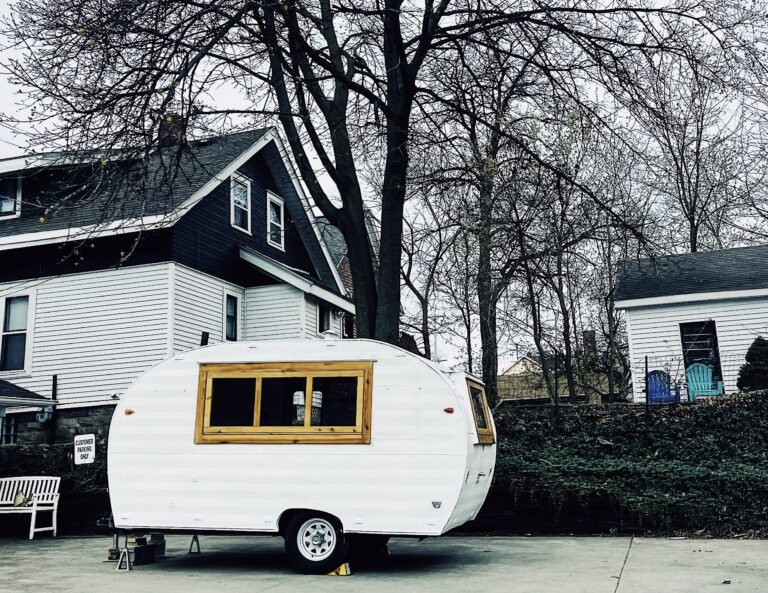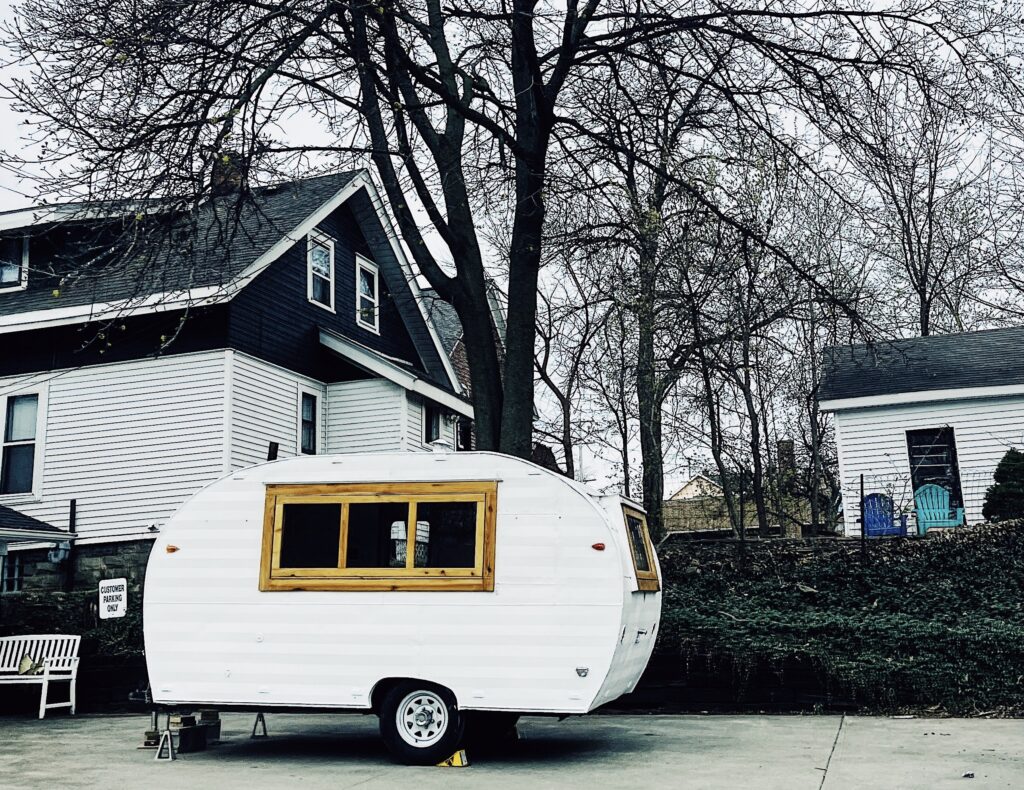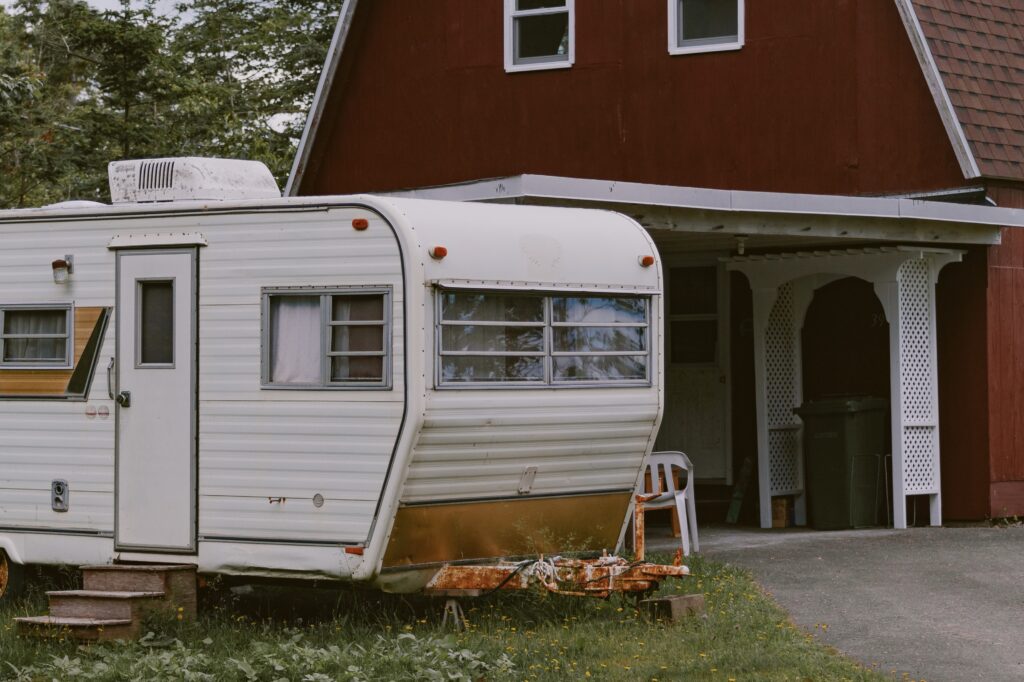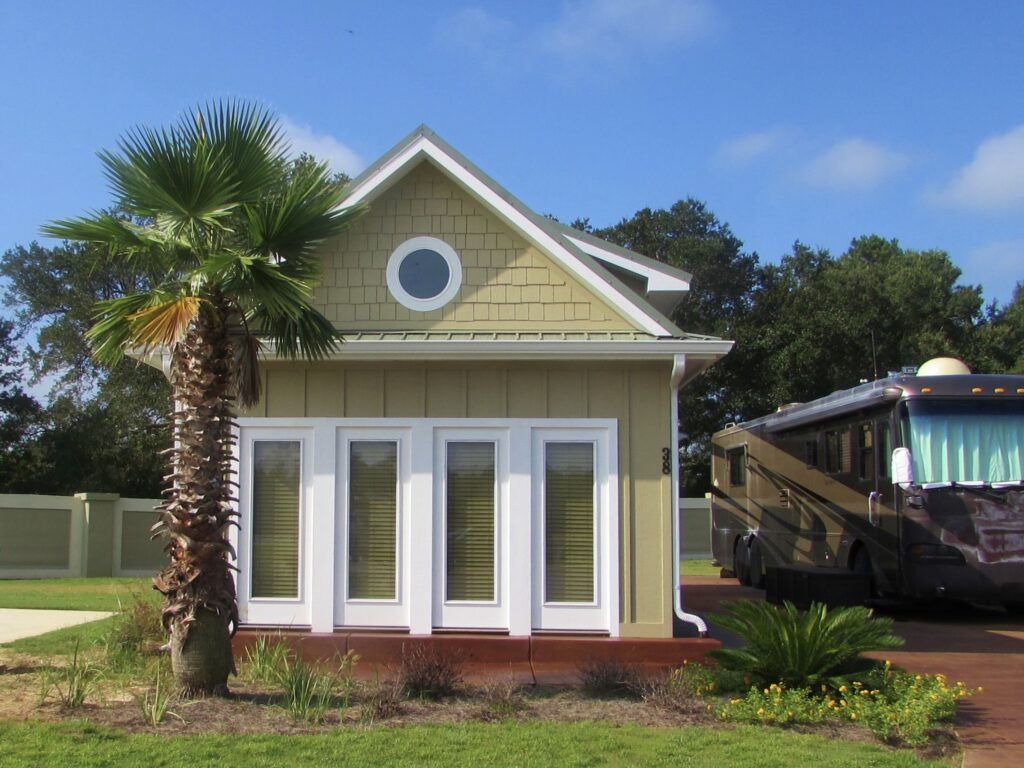
7 Tips for Storing Your RV at Home
One thing that every RV owner has to think about is storage. Where will they keep the RV when it isn’t in use? Many people turn to paid RV storage options, but this isn’t the only choice out there. A second great option? RV storage at home.
Storing your RV at your own home is great for a number of reasons. For one thing, it can be an excellent money saver. It also makes the RV easier to access for routine maintenance, upgrades, and those times when you want to check in on how it’s doing. Lastly, we love that storing your rig at home allows you to pack up and hit the road easily, and if you happen to be renting your rig, it makes the process of renting that much more hassle-free.
All that said, there are some things you will want to know about RV storage at home before you decide to go this route. Here, we will discuss those things so you can go in fully prepared.

Know the Rules
First and foremost, you will need to make sure storing your RV at home doesn’t break any rules. Some cities have laws against it. In other instances, it’s the local homeowners association (HOA) that may not like a given person storing an RV on their property. Fortunately, there are also many places that do allow people to store their RVs at their own homes.
Avoid Steep Slopes
Once you’ve determined whether you’re allowed to go with RV storage at home, the next step is to determine whether it’s actually physically possible. You see, many driveways are quite narrow, and a huge number are also sloped. Meanwhile many yards have drainage ditches running across the front of them.
Since many RVs can’t drive on extreme slopes without bottoming out, nor fit in narrow spaces, nor drive over ditches, you will want to know what obstacles you’re dealing with and whether you can find a way around them before you start trying to park your trailer or motorhome.
Find a Flat Spot
Now that you know for sure that you can get your RV into your yard or driveway, the next thing to do is find a good place to park. It’s important that wherever you choose to leave your RV is as flat as possible, as RV refrigerators should not sit at an angle for any length of time. Additionally, you will want to ensure you are not going to sink into mud or sand, and that you’re out of tall grasses where pests tend to live.
Consider Creating a Parking Pad
One way to make absolutely sure you won’t sink into the ground while helping protect your RV from those pests that tend to come from tall grasses? Create a dedicated parking pad for your rig. The easiest way to do this is probably with gravel. That said, some people choose to go all out and make cement parking pads for their RVs to live on.
Cover It Up
Want to protect your RV from sun damage and possible water damage from rain? You might consider keeping it covered. There are special RV covers out there that do this job nicely, but they can be tricky to get on and off. If you prefer something a bit easier (as well as added protection from hail), consider building a car port over your RV parking pad.

Follow Proper Storage Procedures
No matter where you end up parking your RV on your property, you will want to make sue to follow all the usual storage procedures. Sure, the RV will be right by your home, but that doesn’t mean pests and thieves can’t get in, nor does it mean the cold can’t damage it.
Therefore, you will want to 1) do everything you can to protect the RV from pests, 2) winterize the RV water system, and 3) remove your valuables and lock everything up after each use.
Check In Often
As mentioned above, one of the main benefits of storing your RV at home is the ability to check in on it whenever you see fit. We recommend doing this at least once a week in order to ensure no pests have made themselves at home and that no leaks or other issues have popped up. After all, the sooner you discover and address such issues, the better off you and your RV will be.
Other RV Storage Options
RV storage at home is our favorite way to go about storing a motorhome or trailer. That said, it’s far from the only way. If you can’t store your rig on your property for any reason, you might need to look into the RV storage options listed below.
RV Storage Lot
An RV storage facility is the most obvious place to keep an RV. These are great because they often offer covered RV storage or even indoor RV storage, and even those that only have outdoor storage tend to be gated. That said, depending on where you live, RV storage facilities can also be incredibly expensive, especially if you’re looking to go with an indoor option.
Campground
Another great place to store an RV? A local campground! Many campgrounds have small storage areas attached. These are ideal for those who plan to camp mostly at that same campground, as it makes moving the RV to a campsite a cinch. However, even if you don’t plan to stick to that one campground, using a campground storage lot may still be a good choice, especially since they are often less expensive than dedicated RV storage facilities.
Another idea for storing at a campground is to rent a seasonal or annual site to leave the RV on. This ensures you have a lovely place to stay in your camper whenever you feel like it, but also allows you to move the RV to other sites whenever you see fit.
Friend’s Property
Finally, there is the option of parking on property owned by a friend or family member. In some cases, you might pay a small fee to do this. In other cases, your friend or family member might just be happy to help. Either way, you will need to take all of the above tips for storing your RV at home into consideration, making sure you are storing the RV somewhere it is allowed and that it will be protected while it is parked there.

Turn Your Motorhome into a Rental RV
As we said before, parking your RV at home is absolutely amazing if you plan to rent the rig out to others. This is because the RV is easy to access when your renters show up to pick it up, or when it comes time to deliver the rig.
That said, you can make your motorhome or trailer a rental RV no matter where you end up storing it. Since it’s so easy to rent your RV out on RVshare, the small amount of extra work involved in pulling it out of storage for each rental won’t seem like much at all. Not only that, but if you do end up needing to pay for storage, the money you make renting the rig will almost certainly more than cover that expense.
Sound like a plan? Find out more about renting your RV on RVshare today!
Avoid Storage Altogether by Renting
A completely different option that you may not have considered? You could avoid storing an RV altogether by renting one instead. If you only plan to go RVing a couple of times a year, renting can be an ideal solution.
You see, while owning an RV is awesome, it does require a lot of time and work in order to ensure the camper is well-maintained. Not only that, you’ll also be spending money on RV payments, insurance, storage, and of course, maintenance.
If you aren’t going out regularly or renting your own RV out, you may find that it isn’t really worthwhile to own one. Renting one from someone else is a much better solution for ensuring you get to have RV adventures without dedicating so much time, energy, and money to the cause.
There you have it—tips for storing your RV at home, as well as a few other RV storage options and ideas. Use this info to ensure your RV is stored properly and ready to hit the road when you are!






